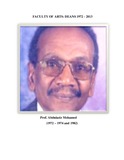| dc.description.abstract | The Faculty of Arts traces its roots to 1956 when the then Royal Technical college admitted its first batch of A level students working toward their London GCE and equivalent examinations. The students offered courses in the Departments of Economics, English, Geography, History and Mathematics. In 1961 the then Royal Technical college was transformed by an Act of the East African Common Services Organization (EACSO) into the second University College of East Africa—the first was the University College of Makerere, Uganda. It was renamed the Royal College, Nairobi and affiliated to the University of London.
The Faculty of Arts was one of the Units of the Royal College and catered for demand for arts-based skills in the then colonial economy. In 1964, the Royal College became the University of Nairobi and a constituent college of the University of East Africa. The students and staff of the Faculty became an integral part of the enlarged regional institution.
In 1965/66, the Department of Education and the Centre for Economics were established. The centre subsequently became the Institute for Development Studies. In 1966/67, the Department of Political Science was established and was later re-named the Department of Government and in 2000 it was further re-named the Department of Political Science and Public Administration to reflect the contents of its academic programs. In 1968/69 sociology which had started as a Sub-department of Economics was elevated and became the Department of Sociology.
In the 1969/70 academic year, the Department of Mathematics was transferred from the Faculty of Arts to the Faculty of Science. The students of the Faculty of Arts were, however, allowed to offer mathematics and to obtain a B.A. degree in mathematics. During the same year, the Sub-department of Linguistics and African Languages (now, Department of Linguistics and Languages) moved out of the then Department of English and became a full-fledged department. In 1987, the Communication Skills Unit was established as an independent teaching unit within the Faculty of Arts. The British Council supported the establishment of the unit by training lecturers to teach communication skills. At the same time the Department of English became the Department of Literature with French as a sub-department.
In the 1970/71 academic year, the then Department of Education was elevated into a Faculty of Education and was re-located to Kenyatta University College. Following the restructuring of the University around 2003, the Department of Economics was elevated to a School of Economics. The restructuring also enabled the Faculty to acquire the Department of Psychology from the former Faculty of Social Sciences in Kikuyu campus following the merger of the faculty with that of Arts.
In 1980/81 the Department of Philosophy and Religious Studies was split into two departments of: Philosophy; and Religious Studies but were subsequently merged into one department.
Student enrolment rose from only 14 students in the 1961/62 academic year to 1,635 in the 1981/82 to 3,000 in 2006 out of which 230 were self-sponsored (Module II B.A. students) and 180 post-graduate students (both regular and self-sponsored) as well as 140 students pursuing diploma studies.
The first intake of students from the 8.4.4. system of education took place in 1990/91 academic year while that of self-sponsored students was started in 1999 when 87 students registered for various B.A. courses. At that time, the country lost a lot of foreign exchange when a large number of students used to go to universities in India, Britain and other countries for their studies. The program was also started as a response to the global trend of opening up of educational opportunities.
Curriculum development which had started in 1998 to accommodate the self-sponsored program has continued to-date. Currently, the Faculty offers over 17 M.A. degree and post-graduate, 14 B.A. degree and 5 ordinary diploma programs. In 1999, the department of Political Science introduced the B.A. Public Administration Program and since then a number of other specialized programs have been started by various departments of the faculty. | en |

